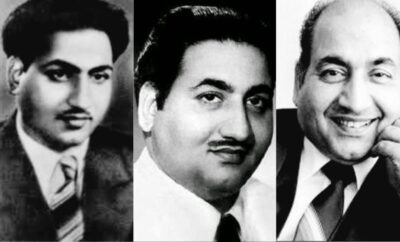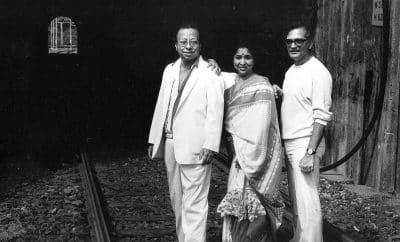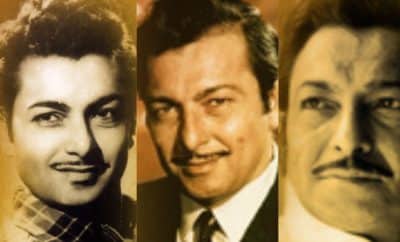Regional Scoop
Marathi Paul Padate Pudhe – Maratha Tituka Melvava – A Step Forward
निश्चयाचा महामेरू। बहुत जनासी आधारू।अखंडस्थितीचा निर्धारू। श्रीमंत योगी।।
An embodiment of determination, benevolence and firmness
Wealthy, yet simple and unattached, like a sage
परोपकाराचीया राशी। उदंड घडती जयाशी। तयाचे गुण महत्त्वासी। तुळणा कैची
With abundant munificence and unmatched virtues
यशवंत कीर्तिवंत। सामर्थ्यवंत, वरदवंत पुण्यवंत नीतिवंत। जाणता राजा।।
A victorious, highly acclaimed, righteous ruler, blessed with strength and wisdom.
कित्येक दुष्ट संहारिले। कित्येकास धाक सुटले। कित्येकास आश्रय जाले। शिवकल्याणराजा।।
A fearless, tactful warrior who destroyed the evils, defeated the invaders;
A patron of many and committed to the welfare of the state.
The above lines in Marathi by Samarth Ramdas (well known saint of Maharashtra) describe the personality of Chhatrapati Shivaji Maharaj very aptly. (The English translation has been provided by one of our readers Indrayani Deshpande). It is next to impossible to find all those qualities in a single person. But Shivaji Maharaj had all those and many more. For those who have read Shriman Yogi by Ranjit Desai will echo these words. Shivaji Maharaj is next to God for majority of people in Maharashtra. Though Maharashtra got its statehood on 1st May 1960, it was Shivaji Maharaj who in 1645 sowed the seeds of Swaraj by conquering the fort of Torna. Shriman Yogi, the biographical work on the life and the achievements of Shivaji Maharaj describes him thus – He was one of the major influences on the revival of nationalism and Hindu culture during a period when centuries of rule by Muslim invaders had induced a condition of apathy and indifference in the people. Shivaji Maharaj was a man who built a dynasty starting from nothing. His motivations were always immense pride in his culture and love for his motherland. However, he was not a bigot and treated all his subjects equally well, irrespective of their religion and other divisions. His battles were mostly with Muslim rulers, but he never showed any animosity towards the Muslim inhabitants of his kingdom. A courageous warrior and a great tactician. At the same time, he was also a very good administrator and the kingdom he was building up became stronger under his rule. He suffered many defeats too, but he never gave up his vision, and ultimately, he did succeed in making his dream a reality.
Over the years, many legends have been added to Shivaji Maharaj’s life and it is hard to filter out these embellishments and just focus on the facts. One such legend was depicted in the Marathi movie Maratha Tituka Melvava (1964). Directed by one of the best filmmakers of Maharashtra Bhalji Pendharkar, the movie is a must see for all. Set against the backdrop of the legend of Shivaji Maharaj conquering his first fort Torna at the age of 15, it is a story of young, naive but a braveheart villager Bhavya (played by Dr. Kashinath Ghanekar) who wants to be a soldier in Shivaji’s army and serve his motherland. His love interest, Rangu (Jeevankala) is a lavani performer, while the young Shivaji is played by Alhad (he’s too good in his portrayal of the role). His mother Jijabai is played by Sulochana. Though she has mostly played the role of vulnerable, sad and pitiful mother in Hindi films, here she glimmers in the role of a brave, courageous mother. Chandrakant Gokhale has aptly played the role of Shivaji’s teacher Dadoji Kondadev. The title of the film has been picked up from a quote by Samarth Ramdas. Swami Samarth Ramdas was a great litterateur, visionary and progressive RashtraSant, adept at diverse topics ranging from spirituality, love of all religions, patriotism, organising people, awakening people, social work, politics, worldly engagements, poetry, literature, metaphysical and physical development. His teachings and techniques helped Shivaji Maharaj to establish the Maratha Kingdom. In his objective to spread and establish Hindu religion he said – Maratha tituka melvava, Maharashtra Dharma vadhvava. Meaning – The Marathi people should unite and spread the religion worldwide.
Apart from its historical story, the film is also known for its songs. Every song in this film is a nugget whose music has been given by Anandghan (Lata Mangeshkar) and all songs except one have been written by Shanta Shelke, the well known Marathi poetess. This particular song – Marathi paul padate pudhe is towards the end of the film, after Fort Torna has been conquered. The depiction, the lyrics, the music of this song are perfect to term it as the Marathi anthem. It comes under the sphurtigeet genre (inspirational, bravery)
It begins with a soulful voice of Hemant Kumar (uncredited) on the tune of Pasaydaan by Sant Dnyaneshwar, followed by the recitals which resemble Manache Shlok by Samarth Ramdas.
Khara swadharma haa aapula
Zari kaa kathinu jaahla
Tari haachi anushthila, bhala dekhe
Even if it seems very difficult to undertake the establishment of Swaraj, which is our real decree, it should begin on a positive note.
Swaye shastra desharth haathi dharave
Pitaave ripula ranee wa maraave
Tujhya rakshana tuch re siddha hoi
Tadaa sankati dev dhavoni yei
Jai Jai Raghuvir Samarth
One needs to pick up weapons for his motherland. Either to defeat the enemy or die on the battlefield. Only if you are prepared to protect yourself from the enemy, God will come and help you. Hail Lord Rama!! Jai Jai Raghuvir Samartha is the chant of Samarth Ramdas.
As the song begins on high notes, we welcome the voice of young Hridaynath Mangeshkar. All the villagers, soldiers, are heading towards Torna fort to witness the glory of first win.
Swaraj toran chadhe
Garjati tofaanche chaughade
Marathi paul padate pudhe
With the conquest of Torna Fort, the establishment of Maratha kingdom takes a step forward in a positive way towards Swaraj. The defeat of the enemy is celebrated at the fort by decorating the main entrance with the traditional door hangings. The cannons sound like the drumbeats welcoming the steps moving towards Swaraj.
Mau menaahuni, aamhi Vishnudas
Kathin vajras bhedu aise
Kot chhaticha abhang tyala
Kadhi na jaatil tadey
Marathi paul padate pudhe
We also see the warkaris (devotees of Lord Vitthal who travel on foot twice a year to Pandharpur) chant Vithoba Rakhumai (Vitthal- Rukmini), to the beats of dholki and cymbals. They further say – we, the devotees of Lord Vishnu, might appear softer than wax in our approach towards life, but if need be, we have the strength to pierce things which are as hard as a diamond or as powerful as a thunderbolt. The wall of our chest will never crack, it is fortified by sheer resilience, courage and bravery.
Maai Bhawani prasanna zaali
Sonpauli gharas aali
Aajach dasra aaj diwali
Chala sayanno, angani ghaalu
Kumkum keshar sadey
Marathi paul padate pudhe
With the beautiful sitar piece in the background, more crowd starts gathering at the fort. As the pace of the song changes, we can see Saibai and Soyrabai, Shivaji Maharaj’s wives approaching towards the fort. They are looking into all the arrangements of the celebration. And the sisters Lata and Asha sing this stanza in their melodious voices.
Goddess Bhawani has blessed us today, she arrives here, at this fort with her golden feet. It is as good as celebrating Dusshera and Diwali here together. Friends, lets make the place ready by sprinkling the saffron water along with the auspicious red kumkum as we move a step forward towards Swaraj.
Bachche aamhi veer udyache
Baalmuthila bal vajrache
Waaras hou Abhimanyu che
Doodh aaiche tej pravahe
Nasaatuni salsaley
Marathi paul padate pudhe
Even the children are enthusiastic about the entire celebration. The other 2 younger sisters join in this stanza – Usha and Meena Mangeshkar-Khadikar.
We children are the brave soldiers of tomorrow. Our small, naive hands have the robustness of a thunderbolt. We are the successors of the brave Abhimanyu. We have been nurtured by a brave mother whose milk flows through our veins. And we join everyone as they take a step forward towards Swaraj.
The excitement builds up to the beats of lejhim (the Marathi folk dance). Finally they announce the arrival of Shivaji Maharaj, Jijabai and Dadoji Kondadev along with his soldiers, subhedars and the troop.
Shubhgadhila shubhmuhurti
Sanai saange shakunvanti
Jai Bhawani, jai Bhawani
Dashdishanna ghumat vaani
Jai jai kaare dumdumvu hey
Sahyadri che kadey!!!
The auspicious time has arrived. The shehnai indicates this favourable time. The voice echoes through all the 10 directions. Let the victory reverberate through the valleys and entire ranges of Sahyadri. The coda of the song ends abruptly on a high notes referring to the excitement of the victory. You start getting goosebumps as young Shivaji Maharaj salutes the flag in his hand and passes it over to his mother Jijabai to hoist it. He indicates that his motherland is as sacred and respectable as his mother. Finally the Maratha flag is hoisted to the booming sounds of the cannons and welcoming sounds of tutari (curved bugles/trumpets). Announcing the first step taken towards Swaraj, conquering the fort of Torna!!
https://www.youtube.com/watch?v=OCHmR4uwH7Y




Bharat Deshmukh
February 19, 2019 at 1:42 pm
Too good…..God bless you
Deepa
February 19, 2019 at 2:01 pm
Thank you!!